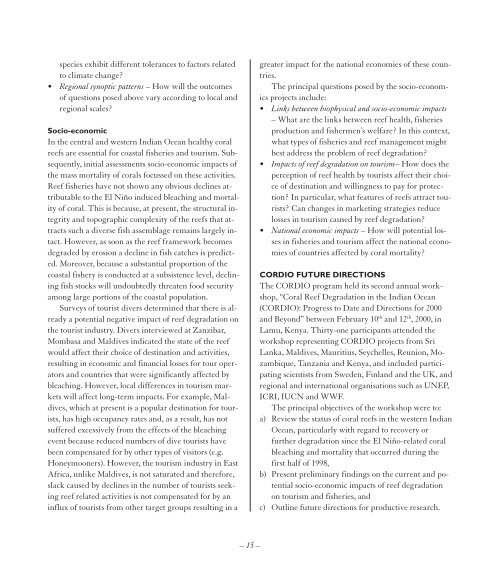You also want an ePaper? Increase the reach of your titles
YUMPU automatically turns print PDFs into web optimized ePapers that Google loves.
species exhibit different tolerances to factors related<br />
to climate change?<br />
• Regional synoptic patterns – How will the outcomes<br />
of questions posed above vary according to local and<br />
regional scales?<br />
Socio-economic<br />
In the central and western Indian Ocean healthy coral<br />
reefs are essential for coastal fisheries and tourism. Subsequently,<br />
initial assessments socio-economic impacts of<br />
the mass mortality of corals focussed on these activities.<br />
Reef fisheries have not shown any obvious declines attributable<br />
to the El Niño induced bleaching and mortality<br />
of coral. This is because, at present, the structural integrity<br />
and topographic complexity of the reefs that attracts<br />
such a diverse fish assemblage remains largely intact.<br />
However, as soon as the reef framework becomes<br />
degraded by erosion a decline in fish catches is predicted.<br />
Moreover, because a substantial proportion of the<br />
coastal fishery is conducted at a subsistence level, declining<br />
fish stocks will undoubtedly threaten food security<br />
among large portions of the coastal population.<br />
Surveys of tourist divers determined that there is already<br />
a potential negative impact of reef degradation on<br />
the tourist industry. Divers interviewed at Zanzibar,<br />
Mombasa and Maldives indicated the state of the reef<br />
would affect their choice of destination and activities,<br />
resulting in economic and financial losses for tour operators<br />
and countries that were significantly affected by<br />
bleaching. However, local differences in tourism markets<br />
will affect long-term impacts. For example, Maldives,<br />
which at present is a popular destination for tourists,<br />
has high occupancy rates and, as a result, has not<br />
suffered excessively from the effects of the bleaching<br />
event because reduced numbers of dive tourists have<br />
been compensated for by other types of visitors (e.g.<br />
Honeymooners). However, the tourism industry in East<br />
Africa, unlike Maldives, is not saturated and therefore,<br />
slack caused by declines in the number of tourists seeking<br />
reef related activities is not compensated for by an<br />
influx of tourists from other target groups resulting in a<br />
greater impact for the national economies of these countries.<br />
The principal questions posed by the socio-economics<br />
projects include:<br />
• Links between biophysical and socio-economic impacts<br />
– What are the links between reef health, fisheries<br />
production and fishermen’s welfare? In this context,<br />
what types of fisheries and reef management might<br />
best address the problem of reef degradation?<br />
• Impacts of reef degradation on tourism– How does the<br />
perception of reef health by tourists affect their choice<br />
of destination and willingness to pay for protection?<br />
In particular, what features of reefs attract tourists?<br />
Can changes in marketing strategies reduce<br />
losses in tourism caused by reef degradation?<br />
• National economic impacts – How will potential losses<br />
in fisheries and tourism affect the national economies<br />
of countries affected by coral mortality?<br />
<strong>CORDIO</strong> FUTURE DIRECTIONS<br />
The <strong>CORDIO</strong> program held its second annual workshop,<br />
“Coral Reef Degradation in the Indian Ocean<br />
(<strong>CORDIO</strong>): Progress to Date and Directions for <strong>2000</strong><br />
and Beyond” between February 10 th and 12 th , <strong>2000</strong>, in<br />
Lamu, Kenya. Thirty-one participants attended the<br />
workshop representing <strong>CORDIO</strong> projects from Sri<br />
Lanka, Maldives, Mauritius, Seychelles, Reunion, Mozambique,<br />
Tanzania and Kenya, and included participating<br />
scientists from Sweden, Finland and the UK, and<br />
regional and international organisations such as UNEP,<br />
ICRI, IUCN and WWF.<br />
The principal objectives of the workshop were to:<br />
a) Review the status of coral reefs in the western Indian<br />
Ocean, particularly with regard to recovery or<br />
further degradation since the El Niño-related coral<br />
bleaching and mortality that occurred during the<br />
first half of 1998,<br />
b) Present preliminary findings on the current and potential<br />
socio-economic impacts of reef degradation<br />
on tourism and fisheries, and<br />
c) Outline future directions for productive research.<br />
– 15 –


















